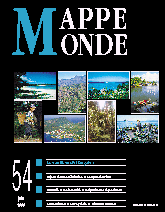

Globalisation and France's overseas departments and territories.
Didier Benjamin. Integration and dependence (5 fig.)
Trade flows and public transfers in the French overseas departments and territories (DOM-TOMs) are shown to be highly concentrated on France and the OECD countries, to the detriment of relations with the immediate geographical environment. However, this economic dependence is also considered from the angle of the need to raise socio-economic levels in the DOM-TOMs. Initially, this was intended to achieve integration into a national area. Now appropriate solutions to the challenges of European integration have to be found.
keywords: FRENCH OVERSEAS DEPARTMENTS AND TERRITORIES, EUROPEAN UNION, INTEGRATION, ECONOMIC DEPENDENCE, POLARISATION, TRADE, FINANCIAL TRANSFERS
Space and society in the french overseas departments (4 fig.)
From the beginnings of colonisation until the middle of the 19th century, France's possessions now known as the overseas departments (DOM) were subjected to economic cycles based on the export of tropical products. From the 1960s, financial transfers took over. A space-time pattern highlights the succession of economic cycles and changes in social structures. The legacy of the use of slave labour during the colonial period continues to affect DOM societies today.
keywords: FRENCH OVERSEAS DEPARTMENTS, SPACE-TIME, SOCIETY
André Calmont, Guadeloupe, Martinique and French Guiana: tropical spaces between insularity and continentality (3 fig.)
Despite an identical institutional status and common features in their societies, Martinique, Guadeloupe and French Guiana have their own specific geographical characteristics. This island, this archipelago and this fragment of a continent contain a diverse range of sub-regions and original spatial organisations.
keywords: FRENCH OVERSEAS DEPARTMENTS (GUADELOUPE, MARTINIQUE, FRENCH GUIANA), CENTRE-PERIPHERY, SPATIAL ORGANISATION
Henry R. Godard, The capitals of the french overseas departments: spatial organisation and social disparities (3 fig.)
Spatial analysis highlights the common structures and convergent dynamics of the capital cities of the French overseas departments. Three maps were produced on the scale of the 64 urban districts that make up the four capitals on the basis of the following indicators: socio-professional characteristics, unemployment and under-employment and number of household appliances. Beyond certain features specific to each urban area, common principles of population distribution and similar ways of structuring urban space are evident.
keywords: FRENCH OVERSEAS DEPARTMENTS (DOM), REGIONAL CAPITAL, URBAN STRUCTURE, CENTRE-PERIPHERY, SPACIAL ORGANIZATION
Thierry Hartog, Christian de Vassoigne. Tourism in France's Caribbean departments (2 fig.)
In intertropical America, Martinique, Guadeloupe and Guiana offer a wide variety of tourism situations and dynamics. By analysing various criteria (origin of flows, length of stays, supply of accommodation, etc.), a spatial typology can be drawn up.
keywords: FRENCH OVERSEAS DEPARTMENTS (GUADELOUPE, MARTINIQUE, FRENCH GUIANA), TOURISM, SPATIAL ORGANISATION
Jean-Christophe Gay. Tourism in France's Pacific territories (2 fig.)
France's overseas territories in the Pacific Ocean have benefited very little from the dramatic expansion of tourism in the region as a result of East Asian economic development. Although growth of tourism flows is slow in the French overseas territories, a spatial reorganisation of tourism is evident, particularly in French Polynesia.
keywords: TOURISM, FRENCH POLYNESIA, TAHITI, NEW CALEDONIA, PACIFIC OCEAN
Paul Le Bourdiec. Espace and development in the Pacific: problem and perspectives. The case of French Polynesia (1 fig.)
The five archipelagos and dozens of islands that make up French Polynesia are scattered, often tiny and sparsely populated. They face common problems: traditional agriculture is on the decline; fisheries remain unsophisticated; accelerating urbanisation is putting increased pressure on the environment; ecological balances are under threat. The territory, whose relative prosperity is based on financial transfers from France, which have diminished since the end of nuclear testing, may be able to solve some of its problems through sensible development of marine resources.
keywords: FRENCH POLYNESIA, DEVELOPMENT, ENVIRONMENT, MARINE RESOURCES
Didier Benjamin, Henry R. Godard. Regional integration and overseas policy (1 fig.)
France's overseas departments and territories (96% of France's exclusive economic zone) give it the third largest maritime EEZ in the world and a presence in all the oceans. However, the overseas territories play only a minor part in the geopolitics of the oceans. This paradox can be explained partly by the difficulties encountered by the overseas territories in integrating into international trade circuits and regional organisations. The disparity in levels of socio-economic development with neighbouring countries also contributes to isolating the overseas territories from their immediate environment.
keywords: FRENCH OVERSEAS DEPARTMENTS AND TERRITORIES, PACIFIC OCEAN, INDIAN OCEAN, CARIBBEAN BASIN, LEVEL OF DEVELOPMENT, GEOPOLITICS, REGIONAL ASSOCIATIONS, GLOBALISATION
Book reviews.
Overseas. (Didier Benjamin, Marie S. Bock, Jean-Christophe Gay, Henry R.Godard)
Mappemonde 1/99![]()
![]() Mappemonde 3/99
Mappemonde 3/99
For subscribe or buy this issue: BELIN
Last modified: May 21, 1999